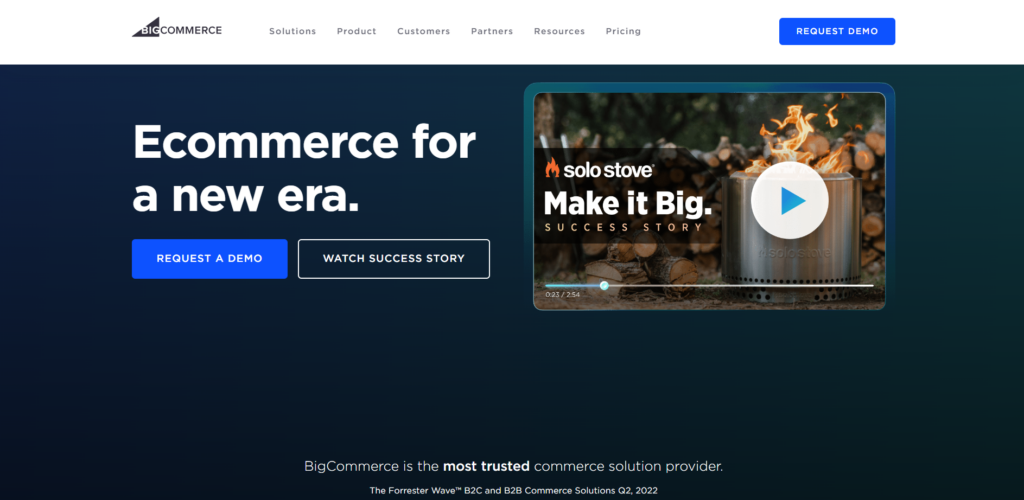
Key Takeaways
- eCommerce provides small businesses with the opportunity to expand their reach and tap into global markets, transcending geographical boundaries.
- Compared to traditional marketing methods, eCommerce marketing offers small businesses a cost-effective approach with lower upfront costs and high return on investment (ROI).
- With eCommerce marketing, small businesses can precisely target their ideal customers, create personalized experiences & optimize their marketing strategies for better results.
In today’s digital era, small business eCommerce is like having a secret weapon that can help them conquer the online world.
It’s a powerful tool that can take small businesses eCommerce from local heroes to global champions.
In this article, we’ll explore how eCommerce marketing can be a game-changer for small businesses, helping them succeed online and reach new heights.
Benefits of small business eCommerce marketing

1. Increased reach
Ecommerce marketing offers small businesses the opportunity to transcend geographical boundaries and reach a global audience.
By establishing an online presence, small business eCommerce can break free from the limitations of their physical location and tap into new markets.
Especially if you use WordPress for eCommerce, you can bet that your SEO rankings will go through the roof.
As the most popular CMS by far, WP offers many benefits for online stores such as SEO-friendliness, endless customization options, eCommerce hosting, hosting multimedia, easy integration, vast WooCommerce community, multi user capability and freedom to a hosting provider you’re satisfied with.
With the ability to sell products or services online, small businesses can attract customers from different regions, countries, or even continents, exponentially expanding their reach and potential customer base.
2. Cost effective
One of the most significant advantages of small business eCommerce marketing for its cost-effectiveness compared to traditional marketing methods.
Traditional advertising often requires significant investments in physical infrastructure, such as stores or billboards.
In contrast, small business eCommerce marketing allows to leverage digital platforms, social media, and online advertising channels, which typically have lower upfront costs.
Small businesses can benefit from affordable advertising options such as pay-per-click (PPC) campaigns, social media ads, or email marketing, all of which can deliver a high return on investment (ROI) without breaking the bank.
3. Targeted advertising
Small businesses eCommerce marketing empowers to target their ideal customers precisely.
Through various online advertising tools, they can segment their audience based on demographics, interests, behaviors, and even previous interactions with their brand.
Small businesses can create highly personalized and relevant experiences for their target audience by tailoring marketing messages and promotions to specific customer segments.
This targeted approach not only increases the effectiveness of marketing campaigns but also enhances customer satisfaction and loyalty by implementing of customer satisfaction surveys.
4. Improved analytics
Digital platforms provide small businesses with a wealth of data and analytics that can significantly impact their marketing strategies.
Small businesses eCommerce marketing enables to gather insights into customer behavior, preferences, and buying patterns.
They can track website traffic, conversion rates, average signing order value, and customer engagement.
Armed with this data, small businesses can make informed decisions, identify trends, and optimize their marketing strategies to drive better results.
By understanding customer needs and preferences, they can tailor their offerings and marketing messages accordingly, resulting in improved customer satisfaction and increased sales.
5. Enhanced customer engagement
Small businesses eCommerce marketing enables to engage with their customers in meaningful ways.
Using tools like an AI animation generator, businesses can create dynamic, eye-catching visuals that enhance customer interaction and capture attention.
Small businesses can foster direct communication with their customers through social media platforms, email marketing, live chat, or interactive website features.
This engagement helps build relationships, gather feedback, address customer concerns, and provide personalized support.
Also, integrating a cloud phone system ensures easy and reliable communication for personalized support.
By creating a positive and interactive experience, small businesses can cultivate win customer loyalty, gain repeat business, and benefit from positive word-of-mouth recommendations.
6. Expanding business hours
Unlike physical stores with limited operating hours, eCommerce websites are accessible 24/7.
Small businesses can leverage this advantage to expand their business hours and cater to customers in different time zones or with different schedules.
This flexibility allows them to capture sales opportunities anytime, ensuring that potential customers can browse and make purchases even outside regular working hours.
7. Competitive advantage
Small businesses eCommerce marketing allows to compete with more giant corporations on a level playing field.
Strategic sales prospecting can help them identify niche markets and untapped customer segments, enabling them to carve out a strong competitive position
By leveraging digital marketing strategies effectively, small businesses can differentiate themselves from competitors, highlight their unique value proposition, and carve out a niche in the market.
They can showcase their brand story, emphasize their customer service, or highlight their product quality, creating a compelling competitive advantage that resonates with their target audience.
8. Scalability and growth potential
Small businesses Ecommerce platforms offer scalability and the potential for exponential business growth.
With a well-designed website and optimized marketing strategies, small businesses can handle increased website traffic, manage a higher sales volume, and scale their operations accordingly.
This scalability allows them to grow their business without facing the constraints often associated with physical expansion, such as renting additional space or hiring more staff.
Strategies of small business eCommerce marketing

1. Search engine optimization
Search Engine Optimization (SEO) is a crucial strategy for small businesses to improve their visibility and organic search rankings. Here are some key elements of an effective SEO strategy:
Keyword research: Small businesses need to conduct competitor keyword analysis to identify the most relevant and high-volume search terms related to their products or services.
By optimizing their website content with these keywords, they can increase their chances of appearing in search engine results pages (SERPs) when users search for those terms.
On-page optimization: On-page optimization involves optimizing website elements, such as title tags, meta descriptions, headings, and image alt tags.
Small businesses can improve their search engine rankings by incorporating relevant keywords into these elements and ensuring that the website follows SEO best practices.
Content creation: Creating high-quality and engaging content is essential for both SEO and user experience.
Small businesses should develop informative and valuable content that addresses the needs and interests of their target audience.
This content can include blog posts, articles, guides, and product descriptions.
By providing helpful information, small businesses can attract and retain website visitors while signaling to search engines that their website is authoritative and relevant.
Small businesses can benefit from external SEO services for on-page optimization and content creation.
These services provide expertise in on-page and off-page areas like technical SEO, link building, and competitor analysis.
You can choose SEO agency to work closely with your business to enhance your online presence and drive organic traffic.
By collaborating with them, businesses can boost their search engine rankings and drive more organic traffic to their website.
Link building: Building backlinks from reputable and authoritative sources is an integral part of SEO. Small businesses can collaborate with influencers, industry experts, or other websites to secure quality backlinks.
These backlinks indicate to search engines that the website is trustworthy and should be ranked higher in search results.
Participating in a link building community can also help small businesses discover backlinking opportunities, learn outreach techniques, and stay updated with evolving best practices.
2. Social Media Marketing
Social media marketing is crucial role in building brand awareness, engaging with the target audience, and driving traffic to a small business eCommerce website.
Here are some effective social media strategies for small businesses:
Platform selection: Small businesses should identify the social media platforms where their target audience is most active.
Whether it’s Facebook, Instagram, Twitter, or LinkedIn, understanding the preferences and behaviors of the target audience can help small businesses focus their efforts on the most relevant platforms.
Content sharing: Small business eCommerce should share valuable and shareable content on their social media to increase brand visibility and engagement.
This content can include product updates, informative articles, videos, infographics, user-generated content, and promotional offers.
It can foster engagement, attract followers, and encourage sharing by providing content that resonates with their audience, thereby expanding their reach.
Targeted advertising: Social media platforms offer robust advertising capabilities that allow small business eCommerce to target specific demographics, interests, and behaviors.
Small businesses can run targeted ad campaigns to reach a wider audience and drive traffic to their website.
These campaigns can be customized based on factors such as location, age, interests, and past interactions with the business.
By reaching the right audience with personalized messages, small businesses can increase their chances of converting social media users into customers.
Email marketing: Email marketing remains a powerful tool for small business eCommerce to engage with their customers and drive sales.
Here are some key elements of an effective email marketing strategy:
3. Building an email list
Small business eCommerce should focus on building an email list by capturing leads through website opt-in forms, social media promotions, or gated content.
By offering incentives such as exclusive discounts or valuable content, small businesses can entice website visitors to subscribe to their email list.
4. Personalization
Personalizing email content based on customer preferences and purchase history can significantly improve engagement and conversion rates.
Small businesses can segment their email list based on customer demographics, interests, or past interactions with the business.
This segmentation allows for highly targeted and relevant email campaigns that are more likely to resonate with recipients.
5. Automation tool
Implementing email marketing automation tools can streamline and optimize campaigns.
Small businesses can set up automated email sequences for welcome emails, abandoned cart reminders, post-purchase follow-ups, and more
Challenges of small business eCommerce marketing

1. Limited resources
Small businesses typically face constraints when it comes to allocating resources for their eCommerce marketing efforts.
They often have limited budgets, which restricts their ability to invest in advertising, hire marketing professionals, or purchase advanced marketing tools.
Additionally, small business eCommerce owners wear multiple hats and may struggle to find the time and manpower necessary to develop and execute comprehensive eCommerce marketing strategies.
2. Intense competition
The online marketplace is highly saturated and competitive, making it challenging for small businesses to stand out among established brands.
Large corporations often have significant marketing budgets and brand recognition, giving them a competitive advantage.
Small businesses need to find unique selling propositions, differentiate themselves through branding, and employ creative marketing strategies to capture the attention of their target audience and gain a competitive edge.
Utilizing a logo AI generator can help small businesses create professional and eye-catching logos quickly and cost-effectively.
Differentiation starts with having a cool brand name that can reflect the brand’s identity as well, which nowadays can be made with a business name generator easily and quickly.
3. Technological barriers
Implementing and managing eCommerce platforms and marketing tools can be overwhelming for small business owners with limited technical expertise.
Setting up an eCommerce website, integrating payment gateways, optimizing for mobile devices, and navigating through various marketing platforms can be daunting tasks.
Small businesses may face challenges in choosing the right tools, understanding analytics, and keeping up with the constantly evolving digital landscape.
4. Security concerns
Ensuring secure online transactions and protecting customer data is a critical challenge for small businesses eCommerce.
With the rise of cyber threats, eCommerce for small businesses need to invest in robust security measures to safeguard customer information, prevent data breaches, and maintain customer trust.
Implementing secure payment gateways, SSL certificates, encryption protocols, and following best practices for data privacy are essential steps in mitigating security risks.
5. Building brand trust
Small businesses may face challenges in establishing brand trust in the online marketplace. Consumers are often hesitant to make purchases from unknown or lesser-known brands.
Building credibility and trust through positive customer reviews, testimonials, social proof, and transparent business practices becomes crucial for small businesses.
They need to actively manage their online reputation, provide exceptional customer service, and deliver high-quality products or services to earn and maintain trust.
Additionally, utilizing a Business Google Slide Template can help small businesses create visually appealing presentations to showcase their efforts in building trust and credibility.
6. Adapting to evolving trends and technology
The digital landscape is constantly evolving, with new trends, technologies, and marketing strategies emerging regularly.
Small businesses must stay updated with these changes and adapt their eCommerce marketing strategies accordingly.
They need to embrace emerging technologies, such as voice search, augmented reality, or artificial intelligence, to provide seamless customer experiences and stay ahead of the competition.
7. Balancing online and offline channels
Small businesses often have both online and offline sales channels, such as physical stores or brick-and-mortar locations.
Effectively managing these channels and ensuring a consistent brand experience across both online and offline platforms can be challenging.
Coordinating inventory, pricing, promotions, and customer support between online and offline channels requires careful planning and execution.
8. Customer acquisition and retention
Acquiring new customers and retaining existing ones is a perpetual challenge for small business eCommerce.
They need to implement effective customer acquisition strategies, such as targeted advertising, search engine optimization, and referral programs.
Additionally, nurturing customer relationships, providing personalized experiences, and offering exceptional post-purchase support are essential for customer retention and contributing to successful customer acquisition.
Small business eCommerce platforms
1. Shopify

Shopify is a popular eCommerce platform known for its user-friendly interface and ease of use. Here are some key features and advantages of using Shopify:
1. User-friendly interface
Shopify offers a drag-and-drop functionality that simplifies the process of customizing and designing websites. Small business owners without technical expertise can easily create and manage their online stores.
2. Extensive app store
Shopify has an extensive app store that offers a wide range of marketing tools and integrations. Small businesses, especially those working with a Shopify agency, can enhance their eCommerce marketing efforts by utilizing apps for email marketing, social media integration, SEO optimization, customer reviews, and more.
3. Secure payment processing
Shopify provides secure payment processing options, allowing small businesses to accept payments from various payment gateways. This ensures a safe and smooth transaction process for customers.
4. Reliable customer support
Shopify offers reliable customer support through multiple channels, including live chat, email, and phone. Small business owners can access assistance whenever they encounter technical issues or have questions about using the platform.
2. WooCommerce

WooCommerce is a flexible eCommerce platform that integrates seamlessly with WordPress, the popular content management system (CMS). Here are some notable features and benefits of using WooCommerce:
1. Seamless integration with wordpress
WooCommerce integrates effortlessly with WordPress, allowing small businesses to leverage the powerful CMS for website design and functionality. It provides flexibility in terms of customization options and design choices.
2. Extensive plugin library
WooCommerce offers numerous plugins that extend its functionality and enhance eCommerce marketing efforts. These plugins cover areas such as marketing automation, SEO optimization, analytics, abandoned cart recovery, and more.
3. Easy inventory management
WooCommerce simplifies inventory management by providing intuitive tools for adding, updating, and tracking products. Small business owners can easily manage stock levels, product variations, and pricing options.
4. Order tracking
WooCommerce enables small businesses to track orders and provide customers with real-time updates on the status of their purchases. This feature enhances transparency and customer satisfaction.
3. BigCommerce

BigCommerce is a scalable eCommerce platform suitable for businesses of all sizes. Here are some notable features and advantages of using BigCommerce:
1. Scalability
BigCommerce offers scalability, allowing small businesses to grow their online stores as their operations expand. The platform can handle large volumes of traffic and transactions without compromising performance.
2. Advanced SEO features
BigCommerce provides advanced SEO features, including customizable URLs, meta tags, and sitemaps, making it an excellent choice for small business SEO services. This helps small businesses improve their search engine rankings and increase organic visibility.
3. Built-in marketing tools
BigCommerce offers built-in marketing tools that facilitate eCommerce marketing efforts. These tools include discount and coupon creation, email marketing integration, abandoned cart recovery, and product recommendations, among others.
4. Secure hosting and 24/7 support
BigCommerce provides secure and reliable hosting, ensuring that small businesses’ online stores are accessible and protected. Additionally, the platform offers 24/7 customer support to assist with any technical issues or inquiries.
Conclusion
To summarize, eCommerce for small businesses is like a superpower that can transform their online presence and catapult them to success.
It opens up a world of opportunities, allowing small businesses to sell their products or services to customers far beyond their physical location.
By embracing eCommerce marketing strategies, small businesses can level the playing field with their larger competitors and connect with their target audience more personally and engagingly.
While challenges like limited resources, competition, and technical hurdles may arise, small businesses can overcome them by leveraging user-friendly eCommerce platforms and staying up-to-date with the latest trends.
With the right mix of determination, creativity, and eCommerce tools, small businesses can unlock the door to growth, expand their customer base, and thrive in the digital marketplace.
So, if you’re a small business owner, consider eCommerce’s power.
Embrace it, harness its potential, and let it be the driving force that propels your business to new heights of success in the exciting world of online commerce.
